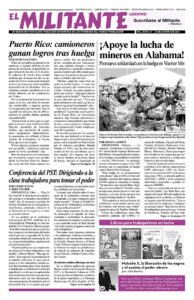Unless it is overturned, legislation that would ban almost all abortions in Texas after six weeks of pregnancy will go into effect Sept. 1. Unlike similar “heartbeat laws” adopted in other states — which have been challenged and ruled unconstitutional — the Texas law authorizes any individual who chooses, as well as the state, to take far-reaching steps to enforce it.
It allows any person to go after doctors, nurses, clinic volunteers and counselors, family members or anyone who helps a woman obtain an abortion or raise funds to cover the procedure. Those found “guilty” would face a fine of at least $10,000. The only exceptions are in cases of life-threatening medical emergencies, but not in cases of rape or incest.
“The state has put a bounty on the head of any person or entity who so much as gives a patient money for an abortion after six weeks of pregnancy, before most people know they are pregnant,” Nancy Northrup, president of the Center for Reproductive Rights, told the press last month.
Some 1,000 people protested against the law days after its passage, gathering at the state Capitol in Austin May 29. “More actions are needed,” Socialist Workers Party campaign chair Alyson Kennedy told the Militant.
Over 56,000 abortions were performed in Texas in 2019, most in the first 13 weeks of pregnancy. Some 90% of the women who went to four clinics run by Whole Women’s Health in the state were more than six weeks into their pregnancy, said director Amy Hagstrom Miller. Nationally, in 2018 around 60% of abortions were obtained by women more than six weeks pregnant.
“Socialist Workers Party candidates across the country defend clinics that provide family planning, including the right to safe and secure abortion,” Kennedy said. “Defending this right is fundamental to a woman’s control of her own life and to the fight for full social, economic and political equality.”
A lawsuit to block the new law’s implementation has been filed by the Center for Reproductive Rights, Planned Parenthood and others, arguing it is an “unconstitutional ban.”
Any “abusive partner, controlling parent or disapproving neighbor” could go after the patient’s doctor in court, the legal challenge says. It asks a federal judge to prevent Texas trial court judges from enforcing the law and to block clerks from accepting any punitive anti-abortion lawsuits from individuals.
The lawsuit names Mark Lee Dickson, the director of Right to Life of East Texas, as a defendant. His “sanctuary for the unborn” campaign has resulted in almost 30 Texas towns adopting ordinances banning abortion. For example, Planned Parenthood in Lubbock had to close its abortion services in June after a judge ruled he did not have any legal grounds to stop a so-called sanctuary ordinance there.
In 1973 the Supreme Court ruling in Roe v. Wade decriminalized abortion up to the point where a fetus can sustain life outside the womb, then considered to be 24 weeks. But since the moment the law was passed, capitalist politicians and state governments have relentlessly sought ruling after ruling restricting that right, closing family care clinics, harassing health care providers and enacting more and more limits on women’s access to exercise her right to choose.
More abortion restrictions have been enacted this year than any other since Roe v. Wade was decided, the Guttmacher Institute, which tracks reproduction statistics, reports.
These restrictions were made easier because of the character and content of the Roe v. Wade decision. It was based on medical criteria centered on “fetal viability,” and required a “doctor’s consent.” This limited abortion to a “health issue” — not a fundamental right based on women’s “equal protection of the law” guaranteed by the Constitution’s 14th Amendment.
About 90% of U.S. counties had no abortion provider at all as of 2017, and since then several other clinics have been forced to close. The sharp drop in the number of clinics hits working-class women and women in rural areas especially hard.
In the fall the Supreme Court will hear Dobbs v. Jackson Women’s Health Organization, which could decide whether state laws that ban previability abortions are unconstitutional. The Jackson Women’s Health Organization is the only remaining licensed abortion provider in Mississippi and it is challenging the “Gestational Age Act,” passed in 2018, which bans most abortions after 15 weeks. Mississippi’s attorney general filed an additional motion in the case in July, urging the Supreme Court to void its previous rulings legalizing abortion. Texas Gov. Gregory Abbott signed a law a few days later that would ban all abortions in the state “the moment Roe v. Wade is overturned.”

